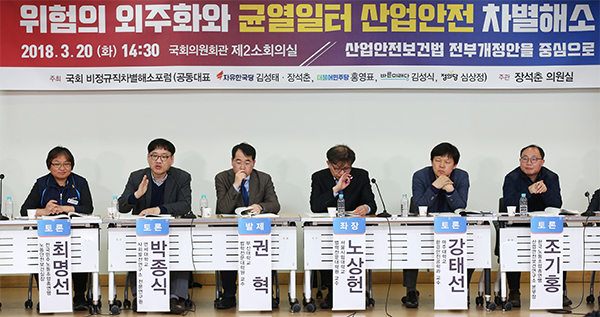
A comprehensive revision bill on the Occupational Safety and Health(OSH) Act which the Ministry of Employment and Labor had made an advance notice of legislation last month for the purpose of reducing the death toll of industrial accidents in half by 2022 was engulfed in the criticism of "a rough and ready revision". It is anticipated that the revision process might face a bumpy road ahead amid the controversy of even "being unconstitutional".
The Irregular Workers' Discrimination Solution Forum of the National Assembly held a debate on 'the risk outsourcing and cracked workplace occupational safety discrimination solutions' at a meeting room of the National Assembly on the afternoon of March 20. The debate this time mainly focused on the comprehensive revision bill on the Occupational Safety and Health(OSH) Act.
The expert panels participated in the debate were generally endorsing the revision direction of the Occupational Safety and Health(OSH) Act, but unanimously lifted up their voices that the process for the revision of the Act has been a rough and ready one.
Cho Ki-hong, director of the OSH Research Institute of the Federation of Korean Trade Unions(FKTU) complained that "Even during the previous administrations, it was rare to bulldoze the OSH law revision without prior discussions with experts, trade unions and employers organizations." Choi Myung-sun, OSH director of the Korean Confederation of Trade Unions(KCTU) requested the Ministry of Employment and Labor to "come up with a meticulous plan to reflect the reality the workers face into the comprehensive revision bill for changes and supplements". The OSH Act has never been revised over 28 years.
The Ministry of Employment and Labor(MOEL) is reportedly planning to hold a public hearing on March 27, but many doubt that it will only serve a purpose of formality. Presenters and panelists of the scheduled public hearing are government officials and researchers who are directly or indirectly engaged in the drafting process of the revision bill submitted by the MOEL, excluding representatives from trade unions and employers' organizations.
reported by Kim Mi-young
translated by Kim Sung-jin

